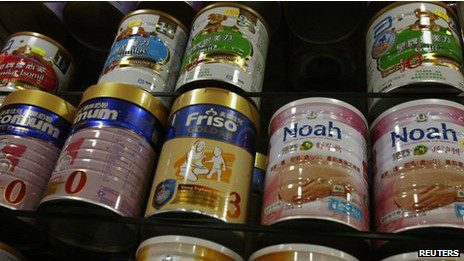
A new investigative report by The Changing Markets Foundation, Globalization Monitor and SumOfUs reveals that the four leading manufacturers of milk formulas are unduly boosting profits by exploiting parents’ understandable desire to give the best possible nutrition to their babies.
The report, Milking It: How milk formula companies are putting profits before science, reviewed more than 400 infant milks for babies under 12 months old from the four leading global manufacturers: Nestlé, Danone, Mead Johnson Nutrition and Abbott, sold at 14 markets. It concluded that product differentiation is not science-based, but instead informed by careful research into consumer preferences, and guided by a desire to increase manufacturers’ market share and profits, especially in highly competitive, rapidly growing Asian markets.
The researchers found ‘premium’ milk formulas contain additional nutrients not required by law or global standard, which claim to get formula milk ‘closer to breastmilk’, or to represent ‘the latest developments in nutritional science’. Other products contain specific ingredients claiming to solve general conditions (preventing allergies, promoting softer stools and better sleep, etc), or to be free of genetically modified organisms. The very fact that companies place infant milks with different formulations on different markets suggests there is little nutritional science and few beneficial health considerations behind their extensive product ranges.

“Our report found that instead of nutritional science, companies are basing their selling strategies on market research and consumer preferences,” said Nusa Urbancic from Changing Markets Foundation. “Product differentials are carefully and deliberately designed to appeal to the tastes and lifestyle preferences of parents, or their natural desire to give their babies the best possible start in life. As such, manufacturers can package these products in ‘premium’ ranges and charge high prices accordingly.”
The report also analysed the retail prices that companies are charging for infant formula within and between different countries. The most expensive products were found in China and Hong Kong, where families can spend 286 USD and 304 USD per month to feed a 2-3-month old baby, respectively, based on using the most expensive product in those markets. This means that parents in China can spend up to 40% of their average salary on infant formula. In comparison, the most expensive formula in European countries will only cost 1-3% of an average salary.
“This report reveals huge disparities in the cost of infant formula, both within and between countries,” said Rena Lau from Globalization Monitor, based in Hong Kong. “Milk formula companies are exploiting the concerns of Chinese parents, who still remember very vividly the melamine contamination scandal and experience environmental pollution in the country, so are willing to pay more for premium products, as well as buy imported products. It is very concerning that premium products cost up to 2.5-times more and that they are not based on any scientifically proven beneficial value, but on parents’ willingness to pay. I would say it causes doubly unfair treatment to Chinese parents.”

Rena Lau, the repersentative of Globalzation Monitor.
European countries have smaller differences in price ranges. In the UK, the most expensive product costs 1.6-times more than the cheapest product, while in Indonesia the difference is 4.5-times.
Globally, only about 36% of babies under six months are exclusively breastfed, as recommended by the World Health Organisation (WHO). Mothers who do not breastfeed can choose from a diverse and ever-expanding range of infant milks. The market for milk formulas is very profitable, currently worth 47 billion USD per year and projected to increase by over 50% by 2020, mainly due to rapid expansion into huge Asian markets. Unfortunately, this combination of vast, profit potential and humanity’s most precious and vulnerable ‘consumer’ almost inevitably gives rise to opportunities for exploitative practices.
Infant milks are designed for consumption by vulnerable babies, many of whom rely exclusively on milk formulas for all their nutritional needs at a key developmental stage in their lives. These products should be highly controlled and subject to regular oversight by governmental authorities. Yet, the report finds, in reality, compliance with nutritional compositional requirements is rarely checked. In addition, companies mostly have free reign to decide how many products and under what prices they place infant milks on the market.
The report’s authors are calling for a comprehensive overhaul of global infant milk products and the introduction of stricter regulation, so that only those products based on unequivocal scientific advice and with the highest quality of nutritional ingredients are sold. The report also calls on governments to introduce and enforce national legislation that fully implements the WHO marketing Code and to ensure that the safety and nutritional quality and completeness of products is regularly verified.
“This study proves that Nestlé and other leading baby formula manufacturers are taking advantage of families with infants wherever they can,” said Eoin Dubsky, SumOfUs campaigner. “It’s time to reign in the marketers and ensure that sleep-deprived and financially-stretched parents who need infant formula can easily find products that are affordable, safe and nutritionally complete.”
Please visit the link below for further information and to obtain a copy of the full report:
